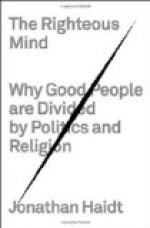|
This section contains 597 words (approx. 2 pages at 400 words per page) |

|
The Righteous Mind: Why Good People Are Divided by Politics and Religion Summary & Study Guide Description
The Righteous Mind: Why Good People Are Divided by Politics and Religion Summary & Study Guide includes comprehensive information and analysis to help you understand the book. This study guide contains the following sections:
This detailed literature summary also contains Topics for Discussion on The Righteous Mind: Why Good People Are Divided by Politics and Religion by Jonathan Haidt.
The Righteous Mind - Why Good People Are Divided by Politics and Religion by Jonathan Haidt is an extensive exploration of man's morality and how it originated and has evolved. Haidt begins with a fundamental question: is man's morality a result of nature or nurture? He asks if man's morality is innate and learned; is the way we treat others just shooting from the hip and a natural reaction that is hard-wired into our genes or is it our upbringing that sets the framework of our morality?
With such a heady premise, Haidt goes on to explore the various theories and concepts that have emerged over many centuries that touch upon this profound question. Haidt presents the theories of developmental psychologist Jean Piaget who found that children have an innate sense of fairness. Psychologist Elliot Turiel learned that young children found that a child's action was wrong if it hurt another child. Psychologist Lawrence Kohlberg piggy-backed on Piaget's theories by adding that adolescents learn to work around what is considered right and fair and become adept at rationalizing their actions as fully justifiable. The work of moral psychologists in the latter part of the twentieth century found that young people had become cynical and egalitarian with regards to moral questions and justifications.
Haidt studied the work of these pioneers in moral psychology and by the time he arrived in graduate school, they had substantively defined it. However, Haidt felt that the studies were too cerebral and lacking in an undeniable element of human nature: emotion. Taking a course in cultural psychology from anthropologist Alan Fiske opened Haidt's eyes. Fiske required his students to read about how kinship, music and sexuality impacted ancient and remote cultures. Haidt began to see a connection between some backward cultures and modern Western societies relative to morality and religion. Studying the work of anthropologist Richard Shweder, Haidt learned that the morality of the individual is largely based on personality and individuality and that cultural mores originate from the need for a society to strike a balance between the needs of the individual and those of the group.
In his vast and thorough work, Haidt considers the theories on morality from such diverse sources as Thomas Jefferson, Plato and his brother, Glaucon, the Orissans of India, Immanuel Kant, Charles Darwin, Edmund Burke and literally scores of psychologists, scientists and scholars. Haidt describes the theory of the "rider" and the "elephant" that is in all of us. The "rider" is the reasoning part of the brain that justifies behavior while the "elephant" is the emotional, instinctual part of the mind. The stronger force is the "elephant" but the "rider's" job is to temper emotional behavior with learned reasoning.
Haidt explains the purposes and benefits of organized religions and man's natural instinct to be part of a group. He explains how the morality of a group overrides the needs and morality of its individuals. Through a process of natural selection, groups evolve and advance with members chosen for their cohesive and altruistic characteristics. Based on personalities and moralistic leanings, Haidt explains why some people are liberal and others are conservative. Based on his studies and research, Haidt concludes that for a society to be successful in the political arena, there must be the presence of both liberal and conservative policies.
Haidt makes the general conclusion that for one group - be it religious or political - to understand the "righteous mind" of a group with opposing views, it is essential that it have a clear knowledge of the other's moral foundation.
Read more from the Study Guide
|
This section contains 597 words (approx. 2 pages at 400 words per page) |

|



